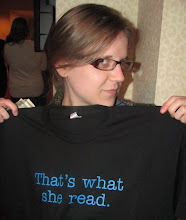Today is the "THIS IS WHAT A YOUNG FEMINIST LOOKS LIKE" blog carnival. For a list of participating blogs, click here.
I've spent the morning reading others' posts. It's really refreshing: Keep it up, everyone.
And now it's time for my contribution:
I'll begin with an excerpt from an entry I posted on the 37th anniversary of Roe vs. Wade, because I think it sums up why I identify as a feminist.
I received an email today from Cecile Richards, via Planned Parenthood's mailing list. In her message, she mentioned that "...this anniversary is always tinged with gratitude and immense responsibility." I feel the same way.
I'm grateful for the progress we've made: when Obama was elected, he overturned the global gag rule and cut funding for abstinence-only sex "education" programs.
But we can't take this freedom for granted; I certainly don't, even though I (like many women I know) am too young to remember a time when abortion was illegal in the US. And that's where my huge sense of responsibility comes in. This is still relevant: the recent death of Dr. Tiller and the Stupak Amendment both serve as proof of that.
So today I'm celebrating Roe while reminding myself (and anyone who might read this) that the fight isn't over, even 37 years later, and if we take what we have for granted, we might lose it.
The keyword is responsibility. I can apply it to everything in regard to feminism: reproductive health, education, and the right to vote (Women's Equality Day--which commemorates the anniversary of the 19th Amendment--was yesterday, by the way). I recognize that although I was born with these rights, many women were not. If I don't bother to exercise them, then I'm showing disrespect to the women who fought so hard to earn those for me.
Another thing: Last fall, one of my professors at SVSU pointed out that things don't always get better for women. They get better, and then sometimes they get worse. The example she gave was that there were more women enrolled in colleges in the US in the 1920s than in the 1950s.
If there aren't people who care enough to protect what we've gained, we'll lose it.
And that is just one of many reasons why I identify as a feminist. It has never occurred to me to think of feminism as a "dirty word." And so it surprised me to find out that quite a few people (not necessarily young people, mind you--I'll get to that), seem put off by the fact that I consider myself a feminist.
A few months ago, I added my aunt as a friend on Facebook. She took issue with some of my more politically-charged posts, and showed them to my grandmother, who called my mom and urged her to intervene, lest I "turn into one of those smelly feminists."
My mom is a wonderful person. We don't agree on a lot of things, but we do communicate. She told my grandmother that if she was really so concerned about my "feminism thing," she ought to just give me a call and talk to me about it herself.
My guess is that my grandmother (who was born in 1940) doesn't like feminism because in the 1960s and '70s, when she was raising children, a lot of women were working toward becoming more than just wives/mothers. And my grandmother chose to be stay-at-home mom, so probably felt that the feminist movement didn't respect her lifestyle.
Fair enough. But I'd love to show her how feminism has evolved. My mom's a stay-at-home mom, too. And I appreciate her immensely for choosing to do that for my sister and me.
But my grandmother never called me. So we haven't talked about it.
And that brings me to this: It's incredibly important for women of different generations to communicate with each other. And we're not doing enough of that. And so now there are older women who believe that young feminists don't exist.
And it depresses me (especially since I do interact with quite a few older feminists who know where I stand). As a young feminist, I have a great deal of respect for the women who came before me, and deeply appreciate their efforts. It'd be nice to have that reciprocated.
We're young, we're here, and we're working.
Feminism is big. It isn't just the wage gap or abortion rights or sexism in the media. It's all of those things and more. And it's impossible for one person to care deeply about all of those feminist issues and pour loads of energy into every single one of them. If we each tackle something we care deeply about, and then communicate with others to see what they're working on, not only will we accomplish more, but we'll have a better understanding of each other, and most importantly, will be able to see that we do indeed have very common goals.
Subscribe to:
Post Comments (Atom)






No comments:
Post a Comment